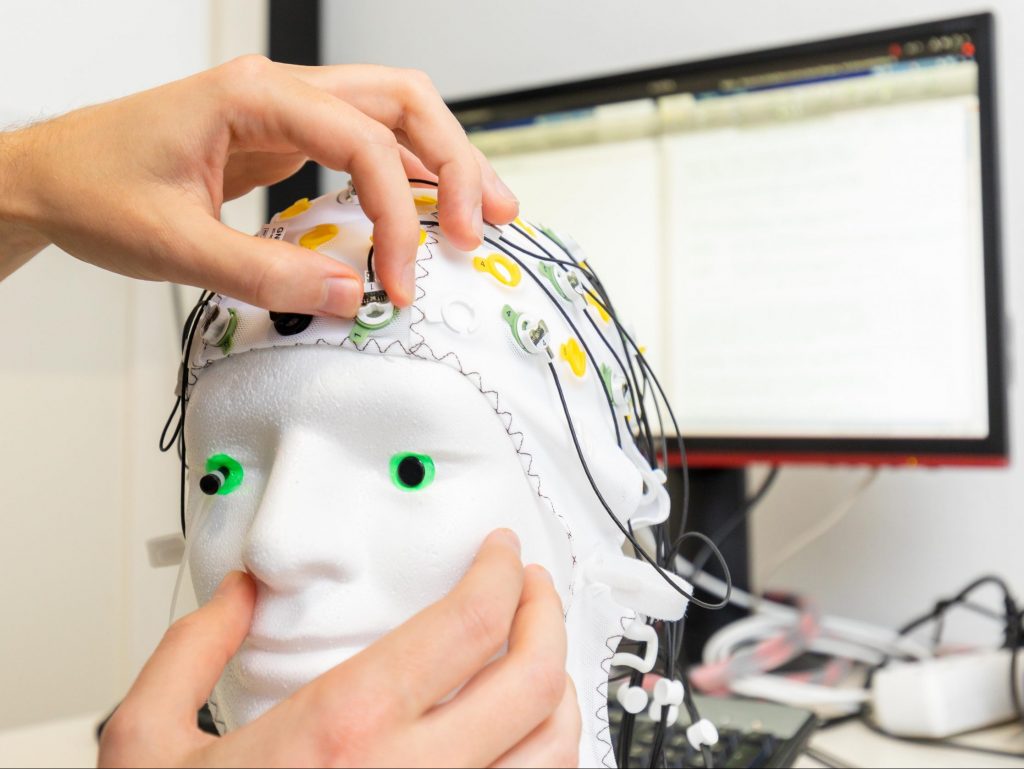Exploring the trade-off between modularity and integration from the point of view of cognitive architectures

©SCIoI
A central trade-off faced by intelligent systems is to strike a compromise between modularity and integration. In this project, we will address this trade-off from the viewpoint of cognitive architectures. Modularity describes the degree to which subsystems process information in an encapsulated fashion. High modularity is indexed by high signal exchange within a module and low signal exchange between modules. A measure of modularity can be extracted from the communication pattern of the parts of the system and can be obtained for a wide range of systems from human brains, artificial neural networks to networks of artificial agents.
Modularity has several advantages: Aside from simplifying the design process of artificial systems, it can act as a regularization that reduces the complexity of the system and hence facilitates the adaptation of the system given limited data. However, there are cases
where increasing modularity decreases performance. For example, when context sensitivity is required information needs to be exchanged between many processing units, which will require a higher degree of integration at the cost of modularity. Thus, the optimal trade-off will depend on the nature of the task given. One of the key aims of this project is to identify the general principles that characterize this optimal trade-off in order to optimize performance.
Related Publications +
2756394
proj013
1
apa
50
creator
desc
year
20173
https://www.scienceofintelligence.de/wp-content/plugins/zotpress/
%7B%22status%22%3A%22success%22%2C%22updateneeded%22%3Afalse%2C%22instance%22%3Afalse%2C%22meta%22%3A%7B%22request_last%22%3A0%2C%22request_next%22%3A0%2C%22used_cache%22%3Atrue%7D%2C%22data%22%3A%5B%7B%22key%22%3A%22K85L2AB6%22%2C%22library%22%3A%7B%22id%22%3A2756394%7D%2C%22meta%22%3A%7B%22creatorSummary%22%3A%22Oksuz%20et%20al.%22%2C%22parsedDate%22%3A%222024%22%2C%22numChildren%22%3A1%7D%2C%22bib%22%3A%22%26lt%3Bdiv%20class%3D%26quot%3Bcsl-bib-body%26quot%3B%20style%3D%26quot%3Bline-height%3A%202%3B%20padding-left%3A%201em%3B%20text-indent%3A-1em%3B%26quot%3B%26gt%3B%5Cn%20%20%26lt%3Bdiv%20class%3D%26quot%3Bcsl-entry%26quot%3B%26gt%3BOksuz%2C%20H.%20Y.%2C%20Molinari%2C%20F.%2C%20Sprekeler%2C%20H.%2C%20%26amp%3B%20Raisch%2C%20J.%20%282024%29.%20Boosting%20Fairness%20and%20Robustness%20in%20Over-the-Air%20Federated%20Learning.%20%26lt%3Bi%26gt%3BIEEE%20Control%20Systems%20Letters%20%28LCSS%29%26lt%3B%5C%2Fi%26gt%3B%2C%20%26lt%3Bi%26gt%3B8%26lt%3B%5C%2Fi%26gt%3B%2C%20682%26%23x2013%3B687.%20%26lt%3Ba%20class%3D%26%23039%3Bzp-DOIURL%26%23039%3B%20href%3D%26%23039%3Bhttps%3A%5C%2F%5C%2Fdoi.org%5C%2F10.1109%5C%2Flcsys.2024.3402123%26%23039%3B%26gt%3Bhttps%3A%5C%2F%5C%2Fdoi.org%5C%2F10.1109%5C%2Flcsys.2024.3402123%26lt%3B%5C%2Fa%26gt%3B%26lt%3B%5C%2Fdiv%26gt%3B%5Cn%26lt%3B%5C%2Fdiv%26gt%3B%22%2C%22data%22%3A%7B%22itemType%22%3A%22journalArticle%22%2C%22title%22%3A%22Boosting%20Fairness%20and%20Robustness%20in%20Over-the-Air%20Federated%20Learning%22%2C%22creators%22%3A%5B%7B%22creatorType%22%3A%22author%22%2C%22firstName%22%3A%22Halil%20Yigit%22%2C%22lastName%22%3A%22Oksuz%22%7D%2C%7B%22creatorType%22%3A%22author%22%2C%22firstName%22%3A%22Fabio%22%2C%22lastName%22%3A%22Molinari%22%7D%2C%7B%22creatorType%22%3A%22author%22%2C%22firstName%22%3A%22Henning%22%2C%22lastName%22%3A%22Sprekeler%22%7D%2C%7B%22creatorType%22%3A%22author%22%2C%22firstName%22%3A%22J%5Cu00f6rg%22%2C%22lastName%22%3A%22Raisch%22%7D%5D%2C%22abstractNote%22%3A%22%22%2C%22date%22%3A%222024%22%2C%22language%22%3A%22%22%2C%22DOI%22%3A%2210.1109%5C%2Flcsys.2024.3402123%22%2C%22ISSN%22%3A%22%22%2C%22url%22%3A%22https%3A%5C%2F%5C%2Farxiv.org%5C%2Fabs%5C%2F2403.04431%22%2C%22collections%22%3A%5B%5D%2C%22dateModified%22%3A%222025-09-26T13%3A16%3A18Z%22%7D%7D%2C%7B%22key%22%3A%22NNXEK4HX%22%2C%22library%22%3A%7B%22id%22%3A2756394%7D%2C%22meta%22%3A%7B%22creatorSummary%22%3A%22Oksuz%20et%20al.%22%2C%22parsedDate%22%3A%222023%22%2C%22numChildren%22%3A0%7D%2C%22bib%22%3A%22%26lt%3Bdiv%20class%3D%26quot%3Bcsl-bib-body%26quot%3B%20style%3D%26quot%3Bline-height%3A%202%3B%20padding-left%3A%201em%3B%20text-indent%3A-1em%3B%26quot%3B%26gt%3B%5Cn%20%20%26lt%3Bdiv%20class%3D%26quot%3Bcsl-entry%26quot%3B%26gt%3BOksuz%2C%20H.%20Y.%2C%20Molinari%2C%20F.%2C%20Sprekeler%2C%20H.%2C%20%26amp%3B%20Raisch%2C%20J.%20%282023%29.%20Boosting%20Fairness%20and%20Robustness%20in%20Over-the-Air%20Federated%20Learning.%20%26lt%3Bi%26gt%3B63rd%20IEEE%20Conference%20on%20Decision%20and%20Control%20%28CDC%29%26lt%3B%5C%2Fi%26gt%3B.%20%26lt%3Ba%20class%3D%26%23039%3Bzp-DOIURL%26%23039%3B%20href%3D%26%23039%3Bhttps%3A%5C%2F%5C%2Fdoi.org%5C%2F10.1109%5C%2FCDC49753.2023.10384001%26%23039%3B%26gt%3Bhttps%3A%5C%2F%5C%2Fdoi.org%5C%2F10.1109%5C%2FCDC49753.2023.10384001%26lt%3B%5C%2Fa%26gt%3B%26lt%3B%5C%2Fdiv%26gt%3B%5Cn%26lt%3B%5C%2Fdiv%26gt%3B%22%2C%22data%22%3A%7B%22itemType%22%3A%22conferencePaper%22%2C%22title%22%3A%22Boosting%20Fairness%20and%20Robustness%20in%20Over-the-Air%20Federated%20Learning%22%2C%22creators%22%3A%5B%7B%22creatorType%22%3A%22author%22%2C%22firstName%22%3A%22Halil%20Yigit%22%2C%22lastName%22%3A%22Oksuz%22%7D%2C%7B%22creatorType%22%3A%22author%22%2C%22firstName%22%3A%22Fabio%22%2C%22lastName%22%3A%22Molinari%22%7D%2C%7B%22creatorType%22%3A%22author%22%2C%22firstName%22%3A%22Henning%22%2C%22lastName%22%3A%22Sprekeler%22%7D%2C%7B%22creatorType%22%3A%22author%22%2C%22firstName%22%3A%22J%5Cu00f6rg%22%2C%22lastName%22%3A%22Raisch%22%7D%5D%2C%22abstractNote%22%3A%22%22%2C%22date%22%3A%222023%22%2C%22proceedingsTitle%22%3A%2263rd%20IEEE%20Conference%20on%20Decision%20and%20Control%20%28CDC%29%22%2C%22conferenceName%22%3A%22%22%2C%22language%22%3A%22%22%2C%22DOI%22%3A%2210.1109%5C%2FCDC49753.2023.10384001%22%2C%22ISBN%22%3A%22%22%2C%22url%22%3A%22https%3A%5C%2F%5C%2Fieeexplore.ieee.org%5C%2Fdocument%5C%2F10384001%22%2C%22collections%22%3A%5B%5D%2C%22dateModified%22%3A%222025-09-26T13%3A16%3A16Z%22%7D%7D%2C%7B%22key%22%3A%22R6NIISR2%22%2C%22library%22%3A%7B%22id%22%3A2756394%7D%2C%22meta%22%3A%7B%22creatorSummary%22%3A%22Oksuz%20et%20al.%22%2C%22parsedDate%22%3A%222023%22%2C%22numChildren%22%3A1%7D%2C%22bib%22%3A%22%26lt%3Bdiv%20class%3D%26quot%3Bcsl-bib-body%26quot%3B%20style%3D%26quot%3Bline-height%3A%202%3B%20padding-left%3A%201em%3B%20text-indent%3A-1em%3B%26quot%3B%26gt%3B%5Cn%20%20%26lt%3Bdiv%20class%3D%26quot%3Bcsl-entry%26quot%3B%26gt%3BOksuz%2C%20H.%20Y.%2C%20Molinari%2C%20F.%2C%20Sprekeler%2C%20H.%2C%20%26amp%3B%20Raisch%2C%20J.%20%282023%29.%20Federated%20Learning%20in%20Wireless%20Networks%20via%20Over-the-Air%20Computations.%20%26lt%3Bi%26gt%3B62nd%20IEEE%20Conference%20on%20Decision%20and%20Control%20%28CDC%29%26lt%3B%5C%2Fi%26gt%3B%2C%204379%26%23x2013%3B4386.%20%26lt%3Ba%20class%3D%26%23039%3Bzp-DOIURL%26%23039%3B%20href%3D%26%23039%3Bhttps%3A%5C%2F%5C%2Fdoi.org%5C%2F10.1109%5C%2FCDC49753.2023.10384001%26%23039%3B%26gt%3Bhttps%3A%5C%2F%5C%2Fdoi.org%5C%2F10.1109%5C%2FCDC49753.2023.10384001%26lt%3B%5C%2Fa%26gt%3B%26lt%3B%5C%2Fdiv%26gt%3B%5Cn%26lt%3B%5C%2Fdiv%26gt%3B%22%2C%22data%22%3A%7B%22itemType%22%3A%22conferencePaper%22%2C%22title%22%3A%22Federated%20Learning%20in%20Wireless%20Networks%20via%20Over-the-Air%20Computations%22%2C%22creators%22%3A%5B%7B%22creatorType%22%3A%22author%22%2C%22firstName%22%3A%22Halil%20Yigit%22%2C%22lastName%22%3A%22Oksuz%22%7D%2C%7B%22creatorType%22%3A%22author%22%2C%22firstName%22%3A%22Fabio%22%2C%22lastName%22%3A%22Molinari%22%7D%2C%7B%22creatorType%22%3A%22author%22%2C%22firstName%22%3A%22Henning%22%2C%22lastName%22%3A%22Sprekeler%22%7D%2C%7B%22creatorType%22%3A%22author%22%2C%22firstName%22%3A%22J%5Cu00f6rg%22%2C%22lastName%22%3A%22Raisch%22%7D%5D%2C%22abstractNote%22%3A%22%22%2C%22date%22%3A%222023%22%2C%22proceedingsTitle%22%3A%2262nd%20IEEE%20Conference%20on%20Decision%20and%20Control%20%28CDC%29%22%2C%22conferenceName%22%3A%22%22%2C%22language%22%3A%22%22%2C%22DOI%22%3A%2210.1109%5C%2FCDC49753.2023.10384001%22%2C%22ISBN%22%3A%22%22%2C%22url%22%3A%22https%3A%5C%2F%5C%2Fieeexplore.ieee.org%5C%2Fdocument%5C%2F10384001%22%2C%22collections%22%3A%5B%5D%2C%22dateModified%22%3A%222025-09-26T13%3A16%3A16Z%22%7D%7D%2C%7B%22key%22%3A%22B8KRIM6X%22%2C%22library%22%3A%7B%22id%22%3A2756394%7D%2C%22meta%22%3A%7B%22creatorSummary%22%3A%22G%5Cu00f6rgen%20et%20al.%22%2C%22parsedDate%22%3A%222024%22%2C%22numChildren%22%3A0%7D%2C%22bib%22%3A%22%26lt%3Bdiv%20class%3D%26quot%3Bcsl-bib-body%26quot%3B%20style%3D%26quot%3Bline-height%3A%202%3B%20padding-left%3A%201em%3B%20text-indent%3A-1em%3B%26quot%3B%26gt%3B%5Cn%20%20%26lt%3Bdiv%20class%3D%26quot%3Bcsl-entry%26quot%3B%26gt%3BG%26%23xF6%3Brgen%2C%20K.%2C%20Pettini%2C%20L.%2C%20Moore%2C%20A.%2C%20Pehrs%2C%20C.%2C%20Eiling%2C%20I.%2C%20%26amp%3B%20Haynes%2C%20J.-D.%20%282024%29.%20%26lt%3Bi%26gt%3BNeural%20after-effects%20of%20task%20set%20representations%3A%20the%20brain%20concurrently%20implements%20vastly%20different%20mechanisms%20to%20handle%20neural%20representation%20that%20are%20no%20longer%20needed%20-%20evidence%20from%20time-resolved%20cross-temporal%20fMRI-MVPA%20classification%20%26amp%3B%20correlation%26lt%3B%5C%2Fi%26gt%3B.%20OSF.%20%26lt%3Ba%20class%3D%26%23039%3Bzp-ItemURL%26%23039%3B%20href%3D%26%23039%3Bhttps%3A%5C%2F%5C%2Fosf.io%5C%2Fmqvjx%5C%2F%3Fview_only%3D045f3ebef4924eeaa8a7f595bc48c9cb%26%23039%3B%26gt%3Bhttps%3A%5C%2F%5C%2Fosf.io%5C%2Fmqvjx%5C%2F%3Fview_only%3D045f3ebef4924eeaa8a7f595bc48c9cb%26lt%3B%5C%2Fa%26gt%3B%26lt%3B%5C%2Fdiv%26gt%3B%5Cn%26lt%3B%5C%2Fdiv%26gt%3B%22%2C%22data%22%3A%7B%22itemType%22%3A%22document%22%2C%22title%22%3A%22Neural%20after-effects%20of%20task%20set%20representations%3A%20the%20brain%20concurrently%20implements%20vastly%20different%20mechanisms%20to%20handle%20neural%20representation%20that%20are%20no%20longer%20needed%20-%20evidence%20from%20time-resolved%20cross-temporal%20fMRI-MVPA%20classification%20%26%20correlation%22%2C%22creators%22%3A%5B%7B%22creatorType%22%3A%22author%22%2C%22firstName%22%3A%22Kai%22%2C%22lastName%22%3A%22G%5Cu00f6rgen%22%7D%2C%7B%22creatorType%22%3A%22author%22%2C%22firstName%22%3A%22Leonardo%22%2C%22lastName%22%3A%22Pettini%22%7D%2C%7B%22creatorType%22%3A%22author%22%2C%22firstName%22%3A%22Alex%22%2C%22lastName%22%3A%22Moore%22%7D%2C%7B%22creatorType%22%3A%22author%22%2C%22firstName%22%3A%22Corinna%22%2C%22lastName%22%3A%22Pehrs%22%7D%2C%7B%22creatorType%22%3A%22author%22%2C%22firstName%22%3A%22Ingmar%22%2C%22lastName%22%3A%22Eiling%22%7D%2C%7B%22creatorType%22%3A%22author%22%2C%22firstName%22%3A%22John-Dylan%22%2C%22lastName%22%3A%22Haynes%22%7D%5D%2C%22abstractNote%22%3A%22%22%2C%22date%22%3A%222024%22%2C%22language%22%3A%22%22%2C%22url%22%3A%22https%3A%5C%2F%5C%2Fosf.io%5C%2Fmqvjx%5C%2F%3Fview_only%3D045f3ebef4924eeaa8a7f595bc48c9cb%22%2C%22collections%22%3A%5B%5D%2C%22dateModified%22%3A%222025-09-26T13%3A16%3A12Z%22%7D%7D%5D%7D
Oksuz, H. Y., Molinari, F., Sprekeler, H., & Raisch, J. (2024). Boosting Fairness and Robustness in Over-the-Air Federated Learning.
IEEE Control Systems Letters (LCSS),
8, 682–687.
https://doi.org/10.1109/lcsys.2024.3402123
Oksuz, H. Y., Molinari, F., Sprekeler, H., & Raisch, J. (2023). Boosting Fairness and Robustness in Over-the-Air Federated Learning.
63rd IEEE Conference on Decision and Control (CDC).
https://doi.org/10.1109/CDC49753.2023.10384001
Oksuz, H. Y., Molinari, F., Sprekeler, H., & Raisch, J. (2023). Federated Learning in Wireless Networks via Over-the-Air Computations.
62nd IEEE Conference on Decision and Control (CDC), 4379–4386.
https://doi.org/10.1109/CDC49753.2023.10384001
Görgen, K., Pettini, L., Moore, A., Pehrs, C., Eiling, I., & Haynes, J.-D. (2024).
Neural after-effects of task set representations: the brain concurrently implements vastly different mechanisms to handle neural representation that are no longer needed - evidence from time-resolved cross-temporal fMRI-MVPA classification & correlation. OSF.
https://osf.io/mqvjx/?view_only=045f3ebef4924eeaa8a7f595bc48c9cb





